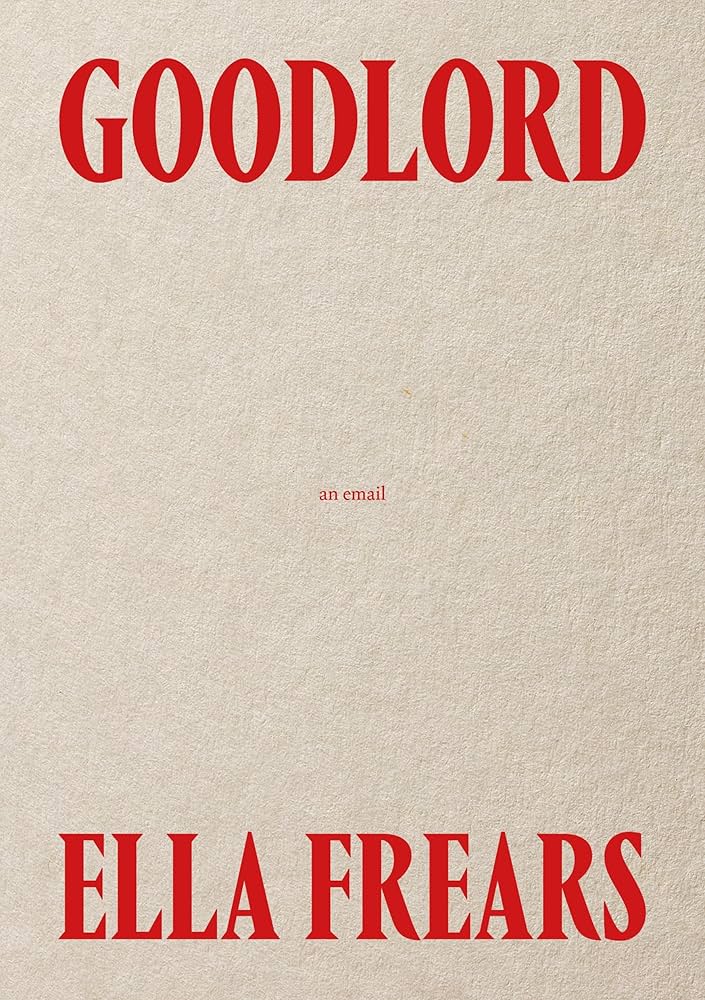GOODLORD (Shortlisted, Forward Prizes for Best Collection)
Ella Frears
(Rough Trade Books 2024); hbk; £14.99
Ella Frears’ second collection, GOODLORD, is a convention-defying tour-de-force. In a form-flouting, novel-length poem framed as an email from an aggrieved tenant to a letting agent, Frear unpacks notions of ownership and autonomy. In an unrelenting pace, with bitter irony and piercing clarity, Frears lays bare the injustices we suffer when our homes and our bodies are deemed someone else’s property.
We’re delighted to be renewing your
tenancy. We’ve partnered with Goodlord,
a property technology company, so you can
sign your renewal contract online. To get
started, you’ll need to set up an account
with Goodlord.
Ava, Nestor Estate Agents[.]
So begins the collection, with a generic and impersonal corporate missive—the writing equivalent of the off-white paint preferred by landlords worldwide. This is the prologue to the main event, Frears’ persona’s response to ‘Ava’, a stream-of-consciousness reflection on the notion of ‘home’, brimming with ‘cold fury’:
Dear Ava,
It’s not your fault this caught me like it did –
Goodlord – the name disturbs me most. As though
we’re meant to pledge ourselves, to call our faceless
landlord good…or God, and I should – should I? –
feel graced, or blessed to live under this roof?
Oh Ava, I was snagged on it.
To tell the truth a thread came loose[.]
The persona’s character is immediately established. The metaphor of ‘I was snagged on it/To tell the truth a thread came loose’, with its playful internal rhyme, suggests a creative and witty individual. At the same time however, the use of repetition, of self-interruption through parentheses, and the frenetic pace set by repeated use of enjambment all add a frantic, desperate edge to the voice.
The persona goes on to reflect on the various places she has called ‘home’—or at least been expected to—such as a basement like ‘a sort of breeze block coffin, just bigger than a double bed’; a house by the coast coated in orange lichen, filled with ‘wild’ young folk who burnt one another’s doors for pranks; a bunting-strewn terrace house of female students affectionately dubbed ‘Girl House’; and several lonely artist residencies punctuated by couch surfing. None of them truly hers; none of them really home. And then there is ‘The Big House’ of the persona’s subconscious—less a dream house than a prison; with ‘winding halls, and grounds,/ and countless rooms that shift’; filled with figures wearing ‘masks that bore the faces of my favourite/people fixed in disappointment’. The persona leads Ava and the reader down its strange, twisting and nightmarish halls, opening rooms to memories and dreams, revealing the architecture of the persona’s life through disjointed recollections, all revolving around the theme of ownership and property.
Alongside all the indignities which come with not owning your place of residence, Frears explores what it means to occupy a body which others seek to possess. Each of the persona’s precarious living arrangements comes with the threat of sexual violence. From handsy coworkers at a pub job she couldn’t afford to leave; to strange men lurking around her isolated studio during a residency; to an attack in the open during a street party, the persona recounts stories of coercion, threats and assault with a detachment born of trauma:
I felt sciencey – you know that feeling, Ava?
Like doing field work
not that I’ve ever worked in science you
understand -
but I’ve often felt my brain
switch, put on a lab coat and observe.
Fourteen I think, was when I felt it first – some
boys from school had asked to see my breasts.
The themes of disassociation and violation merge as the persona rails against subjugation by ‘Goodlord’, the inhuman embodiment of patriarchy and capitalism, its very name a ‘linguistic insult’, loaded with themes of masculine imperialism.
With GOODLORD, Frears takes us on a hectic journey through the life of a sharp-witted, abrasive and compelling protagonist. Her voice is taut and raw, masterfully managing the chaos of the persona’s mind. Frears’ takedown of rape culture and the housing crisis, of how capitalism alienates us from our homes and bodies, is timely and expert in its execution.
Kai Durkin


Leave a Reply